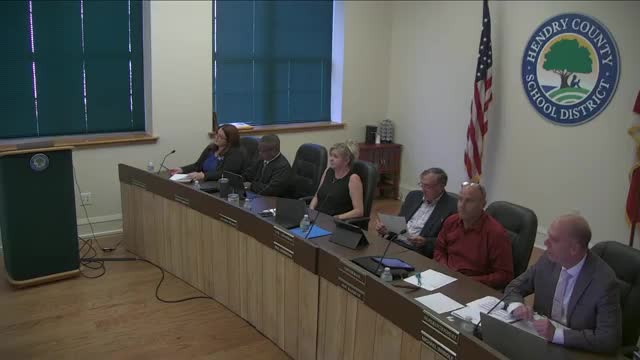Hendry schools highlight teletherapy partnership after state grant
Get AI-powered insights, summaries, and transcripts
Subscribe
Summary
School officials and vendor Presence described on-site and teletherapy speech services, saying the district served about 360 students through 5,300 sessions and recently received a state Department of Education grant to expand the model.
Superintendent Swindle and the district’s special education leaders praised a teletherapy partnership that they say has expanded access to speech and language services across Hendry County.
The district’s ESE and Student Services director, identified in the meeting as Ms. White, introduced Presence representatives and local clinicians and said the state Department of Education visited the district and “left here in awe” of how Hendry handles student services. Ms. White said the department recently received a “very large grant” from the Department of Education to permit the district to work with other districts statewide.
Paige Dershall, partnership director for Presence in Florida, described the company and the services it supplies. “We serve 10,000 schools in Presence. We’ve been around for 16 years,” Dershall said, adding the vendor has provided millions of therapy sessions and a HIPAA- and FERPA-compliant teletherapy platform. Dershall said Presence chose Hendry “because of” the district’s approach and that Hendry was selected as “partner of the year” after the vendor received multiple nominations nationwide.
District staff and Presence described a mixed model of on-site therapy and teletherapy to address shortages of speech-language pathologists in the region. Tracy Dalton, identified as the district’s lead speech and language therapist, and Presence staff said teletherapy is used only where individualized plans show it’s appropriate. “We do look at those needs and we plan accordingly,” the district therapist said, noting some students have produced stronger results in teletherapy than staff initially expected.
Dershall provided usage figures she said were current to February: the partnership served “over 360 students in your district,” delivered “5,300 therapy sessions,” and logged roughly “157,000 minutes of impactful therapy” in Hendry County. The district noted local staff — speech aides and on-site SLPs — support the teletherapy clinicians and help run an integrated program.
District and vendor speakers emphasized the individualized nature of services and said the model is intended to complement — not replace — in-person therapy when that is required. Ms. White and Presence thanked local staff and singled out the district’s speech staff for facilitating visits and clinical supervision.
The presentation concluded with a short recognition of district speech aides who assist therapists in the classroom and a brief Q&A about program operations.
